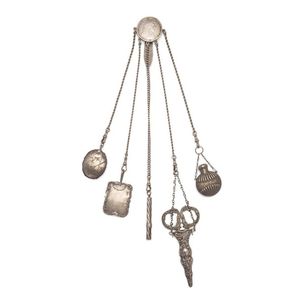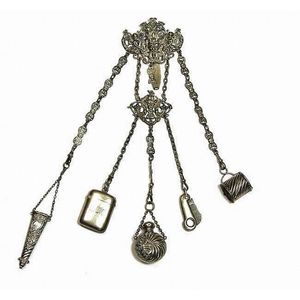Sterling Silver Chatelaine with Putti and Grotesque Decoration
You must be a subscriber, and be logged in to view price and dealer details.
Subscribe Now to view actual auction price for this item
When you subscribe, you have the option of setting the currency in which to display prices to $Au, $US, $NZ or Stg.
- Hallmarks - A mark stamped on articles of precious metals in Britain, since the 14th century, certifying their purity. It derives its name from the Guild Hall of the Goldsmiths' Company, who recieved its Charter in 1327 giving it the power to assay (test the purity) and mark articles of gold and silver.
The hallmark will consist of several marks, including the:
- silver standard mark, indicating the purity of the metal. Sterling silver is .925 pure silver.
- the city mark indicating the city in which it was assayed eg London, Birmingham, York etc.
- the date mark, usually a letter of the alphabet in a particular font and case,
- a duty mark, indicating whether duty had been paid to the crown, and only in use from 1784 to 1890
The piece may include an additional mark, the maker's mark, although not forming part of the hallmark, will be located in the vicinity of the hallmarks.
Sometimes silver plated items will bear faux hallmarks, often confusing those not familiar with silver markings. - Sterling Silver - Sterling silver is a mixture of 92.5% pure silver and 7.5% of another metal, usually copper. Fine silver is 99.9% pure silver, and is relatively soft and the addition of the very small amount of copper gives the metal enough strength and hardness to be worked into jewellery, decorative and household objects.
- Putto / Putti / Amorino / Amorini - A putto (plural: putti) or amerino (plural: amerini) is a cherub or cupid frequently appearing in both mythological and religious paintings and sculpture, especially of the Renaissance and Baroque periods and later used as a decorative element in the design of furniture, ceramics, statuary etc. They are usually depicted as chubby males, or of indeterminate gender, often with wings. Their depiction may represent an association with love, heaven, peace or prosperity.
- Grotesque - Grotesque decoration is any fanciful ornament applied to furniture and decorative arts, and includes distorted faces, mythical animals such as satyrs and sphinxes and less frequently fantastical fruit and flower forms.
The Martin Brothers who set up their pottery at the end of the nineteenth century in Southall, Middlesex derived their fame from their hand made models of grotesque stoneware birds.
This item has been included into following indexes:
Visually similar items

An silver chatelaine, the 800 standard silver scrolling clip with five chains suspended from base holding silver tools, including a tape measure holder, thimble holder, button hook, etc. 7gms

A Victorian chatelaine, hung with a sterling silver scent bottle, sterling silver scissors and case, pin cushion, sterling silver propelling pencil and sterling silver notebook. To be sold with a Scottish citrine kilt brooch.

An Art Nouveau 15ct gold aquamarine pendant necklace, surmount and 3 bar drops set with an oval and 3 pear shape aquamarines (5.5 cm) on a fine cable chain, length 37 cm

A pair 18ct white gold diamond earrings; each a cluster drop centring a round brilliant cut diamond estimated as 0.62ct, G - Vs, to surround and half hoop surmount set with 29 round brilliant cut diamonds totalling approx. 0.32ct. Estimated diamond weight
